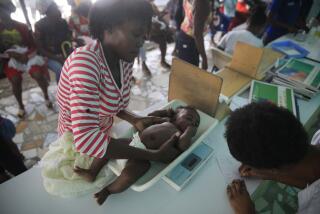Surgery in dire conditions can be safe
- Share via
Scores of people received treatment, even surgery, at hastily assembled field clinics after the massive earthquake in Haiti this year. Health professionals had no choice but to offer the best care they could in terrible conditions, but a new study shows that surgery can be safely performed in areas with minimal resources and little or no sophisticated technology.
The humanitarian organization Medecins Sans Frontieres reported on almost 20,000 surgical procedures completed in resource-limited areas from 2001 to 2008. The death rate was only 0.2%, showing that surgery can be accomplished safely with a set of minimum standards and protocols to guide health professionals.
More effort is needed to provide government, non-government and missionary groups with quality-improvement programs to assist in surgical care in remote areas around the world, said the authors of the study, from Johns Hopkins Medical Institutions and Medecins Sans Frontieres, in Johannesburg, South Africa.
That’s not all that’s needed, added the authors of a commentary accompanying the study. Although about 230 million surgical procedures are performed worldwide each year, only about 4% of them take place in impoverished countries. Yet, those countries are the most likely to need surgical care. The authors of the opinion, from the State University of New York Downstate Medical Center, pointed out that many individual doctors volunteer their time to perform surgery in poor countries. Yet, they say, surgical societies have done little to promote an organized and sustained system providing free surgical care to the poor.
“Even more deplorable is the lack of concern on the part of industry,” the authors said. For example, American companies that make surgical equipment have not contributed to Operation Giving Back, a volunteer program overseen by the American College of Surgeons, they said. The only corporate benefactor of the program is Pfizer, a pharmaceutical company.
The study and editorial were released Monday in the Archives of Surgery.
-- Shari Roan / Los Angeles Times
Return to the Booster Shots blog.





